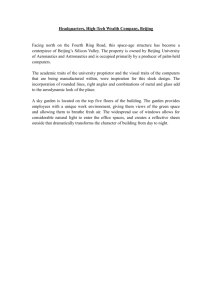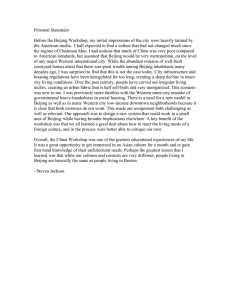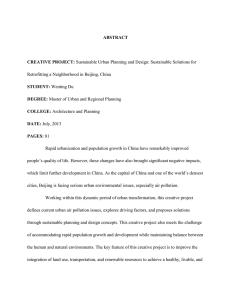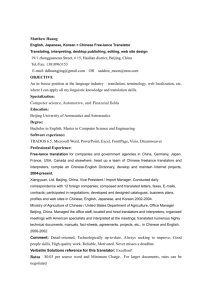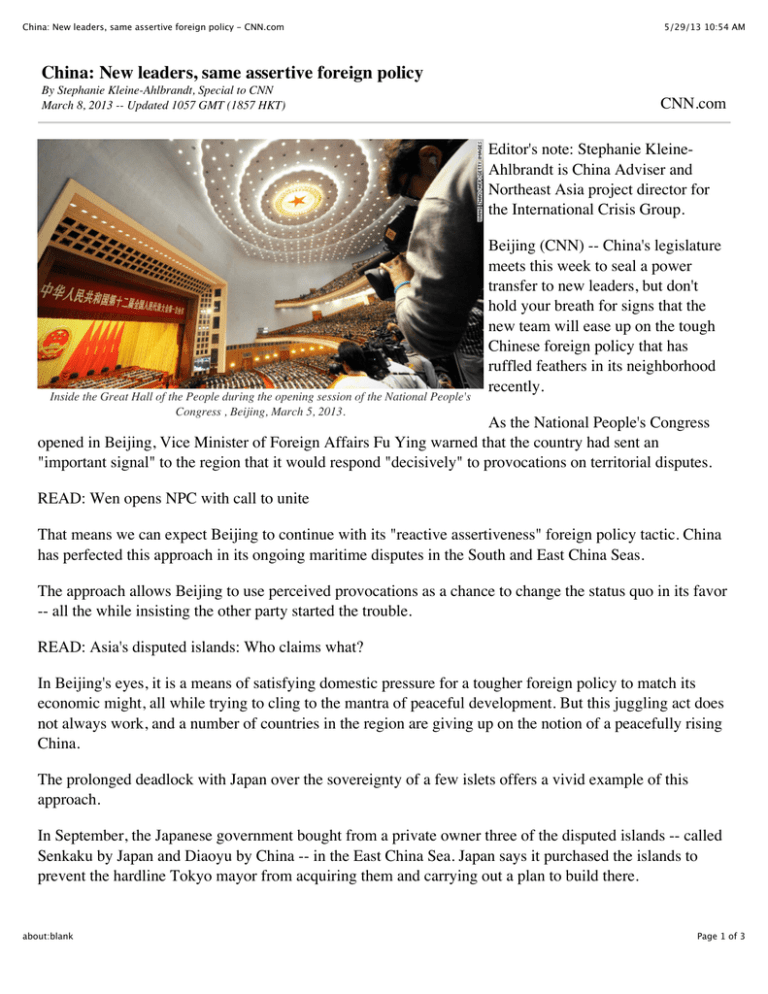
China: New leaders, same assertive foreign policy - CNN.com
5/29/13 10:54 AM
China: New leaders, same assertive foreign policy
By Stephanie Kleine-Ahlbrandt, Special to CNN
March 8, 2013 -- Updated 1057 GMT (1857 HKT)
CNN.com
Editor's note: Stephanie KleineAhlbrandt is China Adviser and
Northeast Asia project director for
the International Crisis Group.
Inside the Great Hall of the People during the opening session of the National People's
Congress , Beijing, March 5, 2013.
Beijing (CNN) -- China's legislature
meets this week to seal a power
transfer to new leaders, but don't
hold your breath for signs that the
new team will ease up on the tough
Chinese foreign policy that has
ruffled feathers in its neighborhood
recently.
As the National People's Congress
opened in Beijing, Vice Minister of Foreign Affairs Fu Ying warned that the country had sent an
"important signal" to the region that it would respond "decisively" to provocations on territorial disputes.
READ: Wen opens NPC with call to unite
That means we can expect Beijing to continue with its "reactive assertiveness" foreign policy tactic. China
has perfected this approach in its ongoing maritime disputes in the South and East China Seas.
The approach allows Beijing to use perceived provocations as a chance to change the status quo in its favor
-- all the while insisting the other party started the trouble.
READ: Asia's disputed islands: Who claims what?
In Beijing's eyes, it is a means of satisfying domestic pressure for a tougher foreign policy to match its
economic might, all while trying to cling to the mantra of peaceful development. But this juggling act does
not always work, and a number of countries in the region are giving up on the notion of a peacefully rising
China.
The prolonged deadlock with Japan over the sovereignty of a few islets offers a vivid example of this
approach.
In September, the Japanese government bought from a private owner three of the disputed islands -- called
Senkaku by Japan and Diaoyu by China -- in the East China Sea. Japan says it purchased the islands to
prevent the hardline Tokyo mayor from acquiring them and carrying out a plan to build there.
about:blank
Page 1 of 3
China: New leaders, same assertive foreign policy - CNN.com
5/29/13 10:54 AM
Beijing interpreted the move as a betrayal of the two countries' agreement to shelve the dispute, and the
subsequent months witnessed a string of Chinese retaliations that have kept tensions in the East China Sea
simmering.
READ: Challenges for China's new leaders
China's retaliatory measures, termed "combination punches" by the state media, ranged from the verbal -leaders labeling Japan's purchase of the islands a "farce" and vowing to "never yield an inch" -- to
economic pressure, large-scale anti-Japan protests and naval exercises in the East China Sea.
But the game-changer came when Beijing
declared its territorial baselines around the
islands, a move that legally places them under
Chinese administration. Once the announcement
was made, China began to regularly dispatch
law enforcement vessels to patrol waters off the
disputed islands, directly challenging Japan's de
facto control of the area for the past 40 years.
Such is the new normal, claim Chinese officials.
But Beijing did not stop there. It sent a
reconnaissance flight directly over the disputed
islands, and Japan responded by scrambling
CNN
fighter jets. The Chinese navy and air force
have intensified their reconnaissance missions and drills in the East China Sea and, according to Japan,
even locked weapons-guiding radar on Japanese military assets, claims China denied.
Despite these actions, officials in Beijing have repeatedly stated that Tokyo started all the troubles and
must accept full blame.
Now, analysts in Beijing claim that a "Pandora's Box" has been opened, and there is no going back to the
tacit agreement that has kept peace in the East China Sea for decades.
Clinton: Diplomacy to end land disputes
Japan scrambles fighter jets
Similar
heavyhanded
action was
used against
the
Philippines
in a spat
over the
Scarborough Shoal in the South China Sea in April 2012. When Manila maladroitly responded to a fishing
about:blank
Page 2 of 3
China: New leaders, same assertive foreign policy - CNN.com
5/29/13 10:54 AM
run-in by sending a warship, China took the opportunity to
strengthen its claim over the disputed shoal by deploying
law enforcement vessels to the area, extending its annual
unilateral fishing ban to cover the waters around the shoal;
quarantining tropical fruit imports from the Philippines and
suspending tourism; and roping off the mouth of the lagoon
to keep out other fishermen.
By maintaining regular law enforcement patrols and
preventing Filipino fishermen from entering those waters,
China has managed to establish a new status quo in its favor.
China signs on to North Korea sanctions
A similar blueprint was then used in response to a maritime law passed by Vietnam in June 2012 that
covered the disputed Spratley and Paracel Islands. Before the ink on the law had dried, China upgraded the
administrative status of Sansha City, encompassing a group of disputed islands in the South China Sea, and
established a military garrison. The development of Sansha City has continued apace. Following the central
government's provision of 10 billion yuan ($1.6 billion) for the construction of the city, Sansha officials are
said to be considering plans to build more ports, open casinos and create an offshore tax haven.
By all accounts, new leader Xi Jinping has played a key role in crafting China's response in its maritime
disputes and was central to Beijing's response to Japan's island purchase announcement. He was put in
charge of a maritime security leading group in mid-2012, then the "Office to Respond to the Diaoyu Crisis"
in September. After taking control of both the communist party and the military in November, his rhetoric
essentially formalized the reactive assertive tactic by repeating the importance of "peaceful development"
while pledging zero tolerance for those who would harm China's "sovereignty, security or development
interests."
That is not to say that Beijing is necessarily looking for external troubles, as it remains preoccupied with
maintaining the momentum of economic development and preventing domestic problems from erupting
into potentially destabilizing unrest.
But unfortunately, there is little appetite in Beijing for blunting the edge of China's "reactively assertive"
foreign policy. If anything, opinions are going the other way. As Fu Ying, Vice Minister for Foreign
Affairs, put it: When facing provocations, the Chinese public "hopes that China will be even more
assertive." If there is any perceived slight, no matter how minor, expect China to pounce.
The opinions expressed in this commentary are solely those of Stephanie Kleine-Ahlbrandt.
© 2013 Cable News Network. Turner Broadcasting System, Inc. All Rights Reserved.
about:blank
Page 3 of 3

